Research News
05 February 2018
The quest to find the optimal speed skating technique
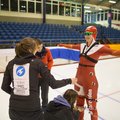
In her search to determine the optimal speed skating technique, doctoral candidate Eline van der Kruk developed a dynamic computer model of a skater and instrumented clap skates. In the future, these will make it possible to offer skaters and coaches real-time visual feedback during training sessions. On Thursday 8 February, the day before the start of the Winter Olympics, Van der Kruk will be awarded her PhD at TU Delft for her work on this subject.
01 February 2018
Collaboration grant awarded to Department of Process & Energy and MIT
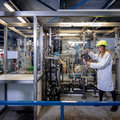
A new initiative focussing on intensifying collaborations between Massachusetts Institute of Technology (MIT) and Process & Energy division of 3ME has just been granted . Massachusetts International Science and Technology Initiatives (MISTI) awarded Global Seed Funds Award, worth 30,000$ to the Intensified Reaction System (IRS) group of the Department of Process & Energy.
01 February 2018
Ricky Curran in AD and De Morgen (in Dutch)

01 February 2018
Signifant funding for smart & cheaper medical devices
Jenny Dankelman, full professor of minimally invasive surgery and interventional techniques, and Tim Horeman, assistant professor of sustainable surgery at the Department of BioMechanical Engineering, will receive significant funding from the Netherlands Organisation for Scientific Research and the Netherlands Organisation for Health Research and Development (NWO/ZonMw) for their research initiative entitled ‘SMART Surgical system: High-quality medical devices making minimally invasive surgery applicable to low-resource settings’.
01 February 2018
"De brug van Boris Johnson" - Interview door Joris Smits (in Dutch)

01 February 2018
Going deeper into the next generation of implants, with three disciplines at once
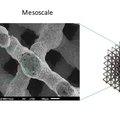
It has been the undisputed gold standard for implants for dozens of years: titanium. This strong, light and corrosion-resistant metal can be safely incorporated into the body. And yet there is a great deal of discussion about how titanium implants are made. The rise of 3D-printing technology has opened the door to new manufacturing possibilities.
01 February 2018
Going deeper into the next generation of implants, with three disciplines at once
It has been the undisputed gold standard for implants for dozens of years: titanium. This strong, light and corrosion-resistant metal can be safely incorporated into the body. And yet there is a great deal of discussion about how titanium implants are made. The rise of 3D-printing technology has opened the door to new manufacturing possibilities.
31 January 2018
PME researcher Nima Tolou contender for 2018 Prince Friso Engineering Award
31 January 2018
Professor Christian Poelma’s inaugural speech: ‘Opaque Flows Clarified’
On Friday 16 February 2018, Christian Poelma, professor of multiphase systems at the Department of Process & Energy, will deliver his inaugural speech ‘Opaque Flows Clarified’’. The speech will begin at 3 PM in TU Delft’s Aula
31 January 2018
The coastal system of the Volta delta, Ghana
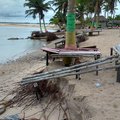
24 January 2018
GROW programme kicks off with a novel pile installation method ’Gentle Driving of Piles’

The first GROW project, ‘Gentle Driving of Piles’, received the approval of the Dutch RVO for granting a subsidy of 2.7 million euro. This project consortium is led by TU Delft and together with the GROW partners Boskalis, Deltares, DOT, Eneco, Sif, TNO, ECN, Shell, IHC, SHL and Van Oord, they will develop and test a novel pile installation method for offshore wind turbines.
24 January 2018
TU Delft develops virtual coach for patients with post-traumatic stress disorder

In the future, a virtual coach could make a positive contribution to the therapy of people with post-traumatic stress disorder (PTSD), such as war veterans or people who suffered sexual abuse in their youth. Such a coach could motivate people to persist with therapy and help them to recall traumatic memories as part of exposure therapy. The virtual coach was developed by Myrthe Tielman, who will be awarded her PhD at TU Delft on Thursday, 25 January.
23 January 2018
In Memoriam: Prof.dr. Hans de Wit
The Department Materials Science and Engineering has received the sad news that our highly appreciated professor-emeritus Prof. dr. Hans de Wit, passed away in the night of the 21st / 22nd January 2018 in Broek op Langedijk at the age of 71 years. His funeral will take place in Schagen on Saturday January 27.
23 January 2018
In search of better Li-ion batteries and alternatives

There is a lot of progress still to be made when it comes to batteries and energy storage. The problem of storing energy is often underestimated however. Gradual evolution in the world of batteries is more likely than a revolution. TU Delft's new batteries lab will focus primarily on research into potential alternatives for what is currently the standard technology: the lithium-ion battery.
19 January 2018
Building ‘scaled-down synchrotron’ begun
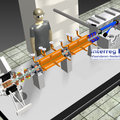
Detecting a hidden layer in a top work of art by Rembrandt, identifying metal fatigue in ships, predicting arteriosclerosis: these are just a few of the possible applications of Smart*Light, a synchrotron that fits on a table. Researchers at Eindhoven University of Technology and Delft University of Technology will build and develop this X-ray source within a consortium of other universities and companies. The high-intensity X-ray beam that this device will produce is now only available via large, expensive and scarce facilities. A symposium on Tuesday 23 January gets the research project officially under way.